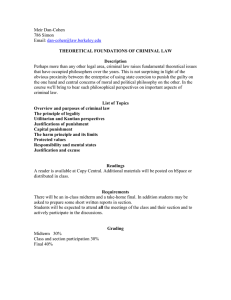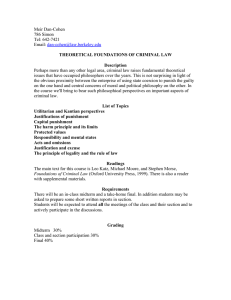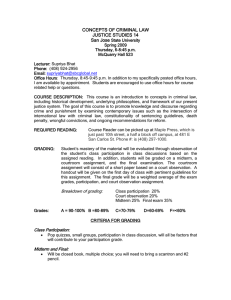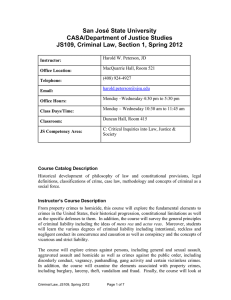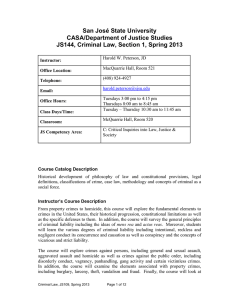CONCEPTS OF CRIMINAL LAW JUSTICE STUDIES 14 Wednesday, 6-8:45 p.m. McQuarrie Hall 521
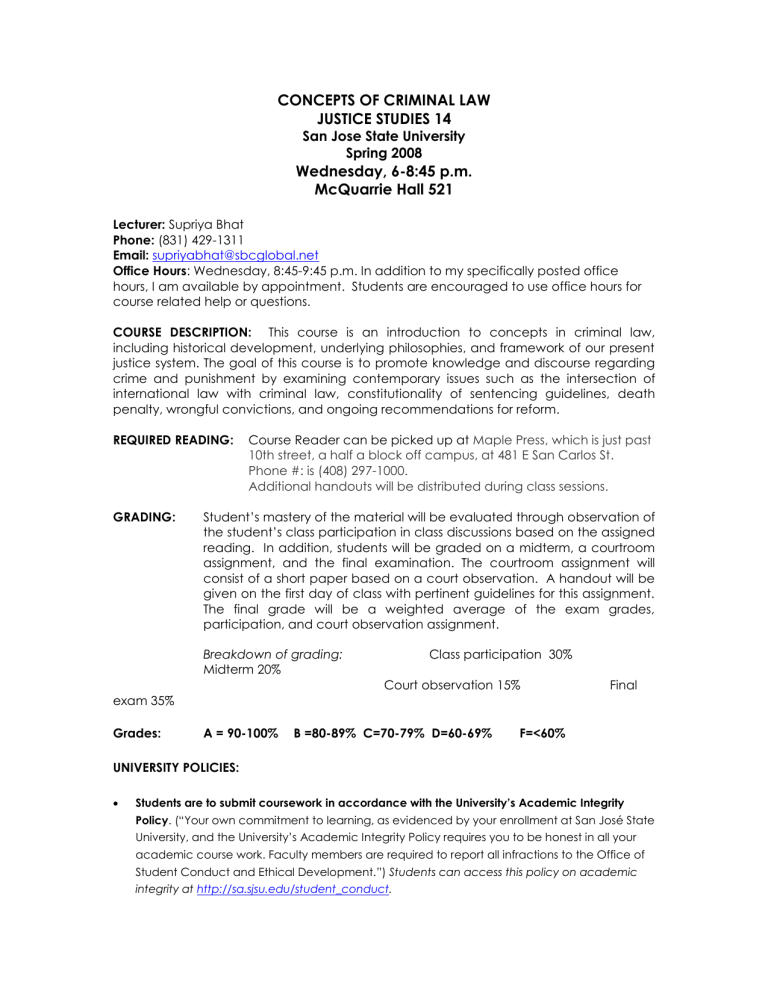
CONCEPTS OF CRIMINAL LAW
JUSTICE STUDIES 14
San Jose State University
Spring 2008
Wednesday, 6-8:45 p.m.
McQuarrie Hall 521
Lecturer: Supriya Bhat
Phone: (831) 429-1311
Email: supriyabhat@sbcglobal.net
Office Hours: Wednesday, 8:45-9:45 p.m. In addition to my specifically posted office hours, I am available by appointment. Students are encouraged to use office hours for course related help or questions.
COURSE DESCRIPTION: This course is an introduction to concepts in criminal law, including historical development, underlying philosophies, and framework of our present justice system. The goal of this course is to promote knowledge and discourse regarding crime and punishment by examining contemporary issues such as the intersection of international law with criminal law, constitutionality of sentencing guidelines, death penalty, wrongful convictions, and ongoing recommendations for reform.
REQUIRED READING: Course Reader can be picked up at Maple Press, which is just past
10th street, a half a block off campus, at 481 E San Carlos St.
Phone #: is (408) 297-1000.
Additional handouts will be distributed during class sessions.
GRADING: Student’s mastery of the material will be evaluated through observation of the student’s class participation in class discussions based on the assigned reading. In addition, students will be graded on a midterm, a courtroom assignment, and the final examination. The courtroom assignment will consist of a short paper based on a court observation. A handout will be given on the first day of class with pertinent guidelines for this assignment.
The final grade will be a weighted average of the exam grades, participation, and court observation assignment. exam 35%
Grades:
Breakdown of grading:
Midterm 20%
Class participation 30%
Court observation 15%
A = 90-100% B =80-89% C=70-79% D=60-69% F=<60%
Final
UNIVERSITY POLICIES:
Students are to submit coursework in accordance with the University’s Academic Integrity
Policy. (“Your own commitment to learning, as evidenced by your enrollment at San José State
University, and the University’s Academic Integrity Policy requires you to be honest in all your academic course work. Faculty members are required to report all infractions to the Office of
Student Conduct and Ethical Development.”) Students can access this policy on academic integrity at http://sa.sjsu.edu/student_conduct .
Students are responsible for understanding the policies and procedures about add/drops,
academic renewal, withdrawal, etc. found at http://sa.sjsu.edu/student_conduct .
Students are expected to participate in classroom discussion in accordance with Academic
Senate Policy on Student Rights and Responsibilities. http://www.sjsu.edu/senate/s90-5htm .
The University encourages “all forms of action which do not interfere with the rights of other individuals or groups or with the essential functions of the academic community”, hence, disparaging remarks pertaining to another's group of origin or affinity, (e.g. age, gender, health status, physical or mental abilities, race, culture, sexual orientation, or religion).
This class is conducted in compliance with the Americans with Disabilities Act: “If you need course adaptations or accommodations because of a disability, or if you need special arrangements in case the building must be evacuated, please make an appointment with me as soon as possible, or see me during office hours. Presidential Directive 97-03 requires that students with disabilities requesting accommodations must register with DRC to establish a record of their disability.”
Date
January 23 Introduction
January 30 Framework/History/Philosophy
2
February 6
SPRING 2008 COURSE SCHEDULE
(SUBJECT TO CHANGE BASED ON AVAILABILITY OF GUEST SPEAKER)
Topic
Elements/Crimes/Defenses
Reading
Section 1
Section
Handouts
February 13 Elements/Crimes/ Defenses: Hypotheticals
Film: 12 Angry Men
Feb 20 Crimes Against the State: Law and Morality
Section 3
Section 4
February 27 U.S. Supreme Court and Criminal Law: Voluntary
Handouts
Confessions and Custodial Interrogations
March 5
5
U.S. Supreme Court and Criminal Law: Search and Seizure
March 12 MIDTERM
Do the Means Justify the End? Use of Informants and
6
March 19
7
Informant Testimony Documentary: Snitches
Civil Liberties and International Criminal Law: U.S. Patriot Act,
Section
Section
Section
Military Tribunals, and Torture
March 26
April 2
8
Spring Recess
Punishment: Constitutionality of Sentencing Guidelines Section
Prison/Restorative Justice
April 9 Punishment continued: Death Penalty and the Moratorium
Court
Assignment
April 16 due
April 23
April 30
11
Film: Murder on a Sunday Morning Section 9
Exonerating the wrongfully convicted: Innocence Projects Section 10
Findings of the Recent Investigation of Criminal Justice Section
May 7
May 14
May 21
System in Santa Clara County
Current Recommendations for Reform: California Commission on the Fair Administration of Justice
Study/Conference Day – No class or Exams
Final Examination
